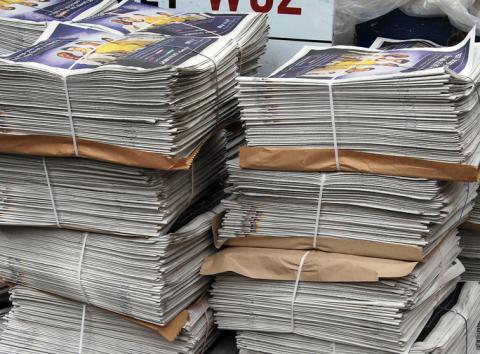Rupert's rules; journalism's failures

The debased media culture that Rupert Murdoch did so much to create - one obsessed with trivia and matters of negligible public interest - has been imported here in spades. By Vincent Browne.
Fifteen years ago, executives of companies controlled by Tony O’Reilly, the then controlling shareholder in Independent News and Media (INM), had a meeting with officials working for the then taoiseach, John Bruton.
At that meeting, the INM people made it clear that, unless Bruton’s Rainbow government acceded to O’Reilly’s demands on the MMDS television transmission system, it would lose the Independent Newspaper Group "as friends’’.
In the final days of the 1997 general election campaign, the most prestigious newspaper in the INM stable, the Irish Independent, published a front page editorial under the headline ‘‘It’s payback time’’, urging readers to reject the incumbent government and vote Fianna Fáil.
Previously, newspapers in that group had been generally favourable to Fine Gael but, over the following decade, newspapers in the INM group - notably the Sunday Independent - appeared to be generally supportive of Fianna Fáil-led governments, the same governments that dragged the country into the calamity we are now enduring.
Some eight years previously, in June 1989, executives of Fitzwilton, another company controlled by Tony O’Reilly, visited the then communications minister, Ray Burke. They gave him a cheque for IR£30,000 from a subsidiary company, Rennicks, as a contribution to Fianna Fáil. O’Reilly said he had no knowledge of the donation.
During the course of the 2007 election campaign, the then taoiseach and the then finance minister, Bertie Ahern and Brian Cowen respectively, had a private meeting with Tony O’Reilly. There was no official disclosure that the meeting had taken place and, when it eventually became public, nobody would say what transpired, other than the claim that the meeting and discussion were of no consequence, ie, it was just a ‘‘normal’’ meeting with a media owner.
I cite this because of the controversy that has arisen in the past week in Britain about secret meetings which David Cameron had with executives of the Murdoch corporation, at which the complete takeover of BSkyB was discussed; and the related controversy over countless secret meetings between Rupert Murdoch and Cameron’s two predecessors as prime minister, Gordon Brown and Tony Blair.
I am not suggesting that there was anything improper in anything Tony O’Reilly did or arranged to have done on his behalf. That is not my point. My point is that for political party leaders and/or taoisigh to meet in secret with powerful media owners necessarily gives rise to questions, not about the media owners but about the politicians and the possible conflicts of interest that are likely to arise in such situations.
And as of the media, the same imperative to increase profit relentlessly operated here as it did in Britain with the similar pressures on standards and practices. Those connections are now under scrutiny in Britain.
So where does this leave similar liaisons with media owners here on the part of our prime ministers here?
Looking at the media more generally here, there is little reason to believe that the kind of things that went on in Britain - within and without the Murdoch corporation - did not happen here too, especially since the debased media culture that Rupert Murdoch did so much to create has been imported here in spades.
In many sections of the media, ever increasing profits became the imperative here as it had become in Britain. And the same celebration of media 'scoops' on matters of almost no importance at all, prevails here too.
An unwitting memorial to the trivialisation of the media was published by the late and unlamented News of the World in its final edition two Sundays ago. It published the front pages of the editions carrying their greatest ‘‘exclusives’’, among which were: ‘‘Andrew and the playgirl’’, ‘‘Princess Margaret love letters sensation’’, ‘‘Hugh told me I was his sex fantasy’’, ‘‘I’m secret dad of Paula Yates’’, ‘‘Cabinet minister and his secret love’’, ‘‘Boris Becker secret love child’’, ‘‘Hewitt sells Di sex letters’’, ‘‘Beckham’s secret affair’’, ‘‘Kerry on coke’’, ‘‘Cheating Roo beds hooker’’, ‘‘Hurley cheats with Shane’’ and, last but not least, ‘‘Giggs’ 8-year affair with brother’s wife’’.
All designed to boost sales and profits, all devoid of any significance to the common public good, at the expense of hurt and invasions of privacy. Many journalists and editors here feel this is entirely legitimate - indeed, laudable.
They and others believe that any interference by the state with their freedom to engage in the abuse of privacy for profit is an infringement of press freedom, the cornerstone of a democracy, and all that malarkey.
When we look back at the record of those of us who have been part of the media for some time, I don’t think we have reason to be self-congratulatory.
How was it that women could be enslaved in laundries throughout their lives, raped while in enslavement and have their children taken from them, not just without their consent but even without them being informed in advance? How could we not have come across this when it went on only a few hundred yards from the newsrooms of the Irish Times, the Irish Independent and the Irish Press?
How was it that the epidemic of clerical child sex abuse was never exposed by us, never investigated, never even suspected by us super sleuths?
How was it - indeed, how is it - that the far wider epidemic of child sex abuse was not and is not being investigated and exposed then and now?
And how is it that a large section of our population live in poverty, some in hunger, denied appropriate health care, denied proper education, denied status, denied respect and denied even the chance to live as long as those of us in the middle classes, and this is almost entirely ignored by the media?
Rupert rules.
Image top: Xiaozhuli.
